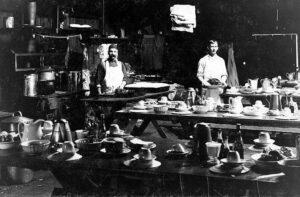Every profession has its own lingo, its way of talking about its work. The timber business jargon is especially colorful, though it differs somewhat from region to region. Take the words logger and lumberjack: on the North Coast, we had loggers in the woods, but in Minnesota, lumberjacks cut trees.

Large pots of Arbuckle are visible on the tables of this timber cookhouse in the Pacific Northwest (photo from the University of Washington).
My husband of 47 years has held a variety of jobs in the woods on the North Coast and he uses interesting words and phrases from time to time. One of the terms I first heard him use was “rocking chair money.” I learned that it meant unemployment checks from the government. When tree cutting in the woods shut down for the winter, loggers were entitled to the benefit. That was what they earned in their rocking chairs for a few months.
I fear we may lose track of many words and phrases as the work force diminishes in the timber industry, so I have jotted down here a few descriptive phrases from the redwood region.
I particularly enjoy the food and cookhouse terms. You could ask someone to pass you the Arbuckle, the coffee brand served in most dining halls. Arbuckles’ coffee became popular in the post-Civil War era as the West was opening up. Brothers John and Charles Arbuckle developed a new concept in the coffee industry—roasted coffee in one-pound packages—and their coffee was the beverage of choice in mining and logging camps.
Besides coffee, breakfast featured cackle berries, or hen fruit. The eggs usually came with pancakes—also known as stove lids, morning glories, or blankets—and bacon, aka sow bosom.
You hoped your cookhouse did not employ a belly burglar, a poor cook, but instead had a good hash slinger. If you were lucky, the doughboys (bakers), made good door knobs (biscuits), and did not serve you cold sheets (tough donuts).
Firecrackers were the term for cooked beans; if you were late to the dining hall, you got to enjoy cold firecrackers for dinner. The crumb boss (head cook) could serve you Murphys (potatoes) and beggies (rutabagas) with gut (cooked bologna). Would you like red lead (catsup) with that? Just don’t enter the cookhouse smelling of cougar’s milk—illegal homemade whiskey.
On Sundays, loggers often engaged in “boiling up,” which should not to be confused with any culinary task. It was the term for washing clothes in very hot water to kill vermin. Your louse cage (long underwear) was especially in need of boiling up. It must have been a constant battle because the cootie cage (bunkhouse) was often infested with traveling dandruff or pants rabbits (lice).
Two great publications go into detail on the jargon used all over the U.S. Lumberjack Lingo by L.G. Soren is in the Kelley House library, and you can find Logger Language in Redwood Country, by Lynnwood Carranco, online.
The Kelley House is open from 11:00 AM to 3:00 PM Thursday through Sunday. Contact us at info@kelleyhousemuseum.org to make an appointment, or just drop by. Walking tours of the historic district depart from the Kelley House regularly; for tour schedule, visit www.kelleyhousemuseum.org.